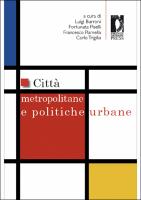Città metropolitane e politiche urbane
Contributor(s)
Piselli, Fortunata (editor)
Burroni, Luigi (editor)
Ramella, Francesco (editor)
Trigilia, Carlo (editor)
Language
ItalianAbstract
More than fifteen years after the introduction of direct election, the mayors are still the most popular politicians in Italy. The personal relationship set up with the citizens and the strengthening of the city councils has restored energy and stability to the action of the municipal administrations. Nevertheless, these institutional reforms, while important, have failed to guarantee good government. The effects of the mayoral reform are, in fact, considerably different from one city to another, and from one type of policy to another. What does this variety of results derive from? The book provides an answer to this question through an investigation of the decisional processes of around a hundred "local collective assets" in six large metropolitan cities. To explain the different outcomes – in addition to the "council effect", that is, the relevance of policy, and the "sector effect", the relevance of the different decisional milieus – the authors also underscore the role of the "governance effect", namely the different approaches to decision-making and building consensus on urban policies.


 Download
Download Web Shop
Web Shop